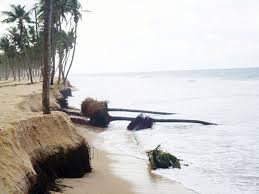Onome Amuge
The Lagos State Government has unveiled plans to raise over N3 trillion through public-private partnerships (PPPs) to combat the escalating threat of coastal erosion along its extensive 180-kilometre shoreline.
Ekundayo Alebiosu, the commissioner for waterfront infrastructure development, announced the funding strategy during a ministerial press briefing, highlighting the prohibitive costs associated with large-scale erosion control measures.
While the state has already begun deploying groynes, which are rigid structures designed to trap sediment and control erosion, Alebiosu conceded that the sheer scale of the challenge necessitates significant external investment.
“Though Lagos State has already begun implementing this technology, the sheer scale of the challenge to stretch the usage along the 180km stretch of shoreline presents a significant financial burden. It costs a huge amount to construct a single groyne, and with a targeted 180km coastal stretch, the projected cost exceeds N3 trillion, a figure that makes it clear that strategic collaboration is required,” he explained.
In a bid to secure international expertise and partnerships, Alebiosu disclosed that he recently led a delegation to the Netherlands, a nation renowned for its pioneering work in coastal engineering. He noted that the Dutch model, which integrates groynes, sand nourishment, and nature-based solutions, offers a potential blueprint that could be adapted to Lagos’ unique geographical context.
Alebiosu stressed that the issue of coastal erosion extends beyond Lagos’ borders, posing a wider environmental and economic risk to Nigeria as a whole.
“This is not just a Lagos problem, it is a national environmental and economic challenge. “If we are serious about preserving our shoreline, preventing further erosion, and protecting coastal communities, then a robust partnership with the federal government and the private sector is not just desirable, it is absolutely necessary,” he noted.
The commissioner positioned the initiative as central to the broader economic and environmental objectives of Governor Babajide Sanwo-Olu’s administration, aimed at safeguarding lives and assets while unlocking the economic potential of Lagos’ vast waterfronts.
“We cannot afford to delay. Entire communities are at risk, and if left unchecked, the consequences of coastal erosion could be devastating, not only to the environment but also to livelihoods and investments across our coastal zones,” Alebiosu added.
He reaffirmed the state government’s commitment to forging alliances with international partners, federal agencies, and private investors to deliver long-term, climate-resilient solutions that will safeguard Lagos’ vital waterfronts for future generations.









